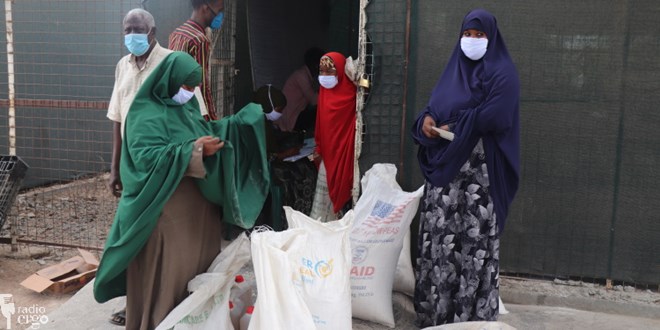
Wednesday October 13, 2021

Refugees in Dadaab are cooking one meal a day as food aid is cut/Ahmed Abdullahi Jama/Ergo
(ERGO) - Adar Sugow Abdi, a mother of five living in Hagadera refugee camp in northern Kenya, is worrying how to eke out the food she received for two months: 50 kilograms of rice, 10 kilograms of beans, and 12 kilograms of cooking oil – half what they used to receive in aid.
With the camps in Dadaab set to close in June 2022, there is also a severe shortfall in donor funding for essential services for the more than 200,000 Somali refugees living in the complex.
“This food ration is not enough for us to cook breakfast, lunch and dinner,” complained Adar. “I have a disabled daughter and an elderly mother-in-law, who can’t stay hungry. The children who go to school need three meals a day.”
Adar, whose family arrived in Dadaab in 2011 fleeing drought in southern Somalia’s Kismayo district, have no sources of food or income apart from the aid distributed by the UN’s World Food Programme (WFP). In September, WFP announced a reduction of 48 per cent in food aid for the 440,000 refugees in Kenya, including the camps in Dadaab and Kakuma.
Adar said her family was already reeling from the impact of COVID19, which left her husband jobless. He was working as a labourer in the camp market, but business activities shrank drastically when the pandemic began.
“Before COVID19 happened, I used to cook three meals a day for the children. Their father was working, and he used to come back home with good sums of money. But since COVID19 struck, all that has stopped,” she said.
Adar has accumulated a debt of 10,000 Kenya shillings (100 dollars) at the local food store and cannot take any more food until she pays it off. They are down to two meals a day.
She is thankful to have received 4,800 Kenya shillings in cash aid for the eight family members registered on her WFP card, calculated at 600 per person. She wonders if that will also be reduced or cut in future.
Suldano Ibrahim Abdulle, a divorced mother of four, received the news of the aid cuts with shock. She was already struggling. Her food card has five registered beneficiaries – herself and the four children – but she is also supporting four relatives who are not registered.
“The food ration we received used to last us for 30 days, when we cooked lunch only, without breakfast and supper. We are very worried about the food ration cut. The little we have received now won’t last us for the next two months,” she said.
Suldano has lived in Hagadera since fleeing conflict in Mogadishu in 2011. The four distant relatives she is now hosting arrived after the registration of new arrivals in Dadaab had stopped four years ago. These relatives from Mogadishu have no close family in the camp and no other means of support.
“Since I can’t afford to buy meat, I usually make soup from the beans by adding a little salt and oil so that the children can eat it with pasta, rice or even sometimes with pancakes. But I’ve only received six kilograms of beans, which is not enough at all,” Suldano said. “I can’t afford potatoes, tomatoes or chicken stew, let alone milk for the tea,” she said.
WFP is seeking $40.4 million from donors to continue supporting the refugees in Kenya and warned that it may be forced to halt assistance altogether by the end of the year.